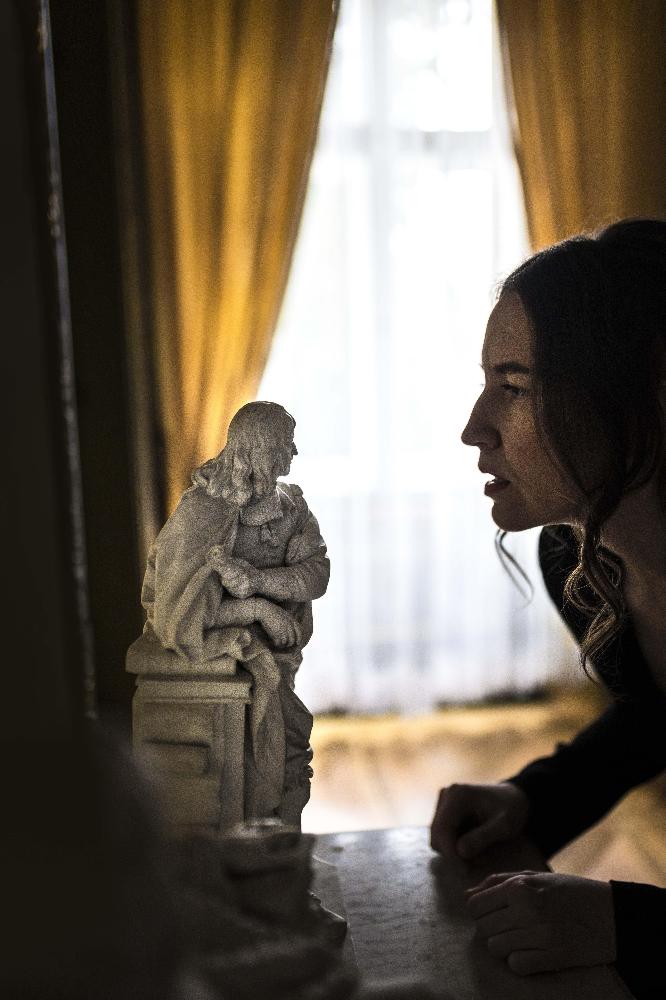The Critic as Artist: Mieke Bal
The Critic as Artist: Mieke Bal
10 November 2017 – 25 February 2018

Reasonable Doubt: Scenes from Two Lives 2016 (still)
Scenes from the lives and works of René Descartes and Kristina, Queen of Sweden
written and directed by Mieke Bal
theoretical fiction | docudrama
multiple-screen video installation, duration: 5 x 00:30:00
The UQ Art Museum presents the second of two film works drawn from large-scale multimedia installations that explore new possibilities in literary and art criticism. Creative, collaborative, and highly experimental, they take up the traditional tasks of arts criticism and scholarship – to interpret and evaluate the aesthetic and intellectual objects of the past – while also reimagining the critic as artist.
Mieke Bal's Reasonable Doubt: Scenes from Two Lives 2016
As an experiment to audio-visualise thought, this project stages scenes from two lives, briefly crossing in an intellectual friendship. It is not a biography but a series of scenes that constitute a double portrait. Some of scenes are historical, some my fictionalising way of doing justice to historical ideas relevant for today.
After a relationship by correspondence, philosopher René Descartes (1596–1650) met and briefly interacted with Queen Kristina (1626–1689) in Stockholm, where he died six weeks after arriving, due to the cold. Once Descartes had reached Sweden, the two didn’t see each other much. Kristina’s philosophical interest was genuine enough. But he was there in a more or less decorative function, to adorn Kristina’s ambitious project of creating an Academy that would put Sweden’s intellectual elite on the European map.
Descartes left Western thought with a burden and a treasure. The burden: a misconstrued dualistic tradition. In my view, he accepted the dualism of the Catholic Church, but fought against it all his life because it is not reasonable. The treasure: a decisive advance in rational thought that, precisely, did not excise the body; nor religion for that matter. The (in)famous cogito can be interpreted in the opposite direction, an attempt to embody thought. In this project I look back from his last book, The Passions of the Soul and see the ongoing struggle against dualism in different episodes of his life.
This struggle is of concern to me because, among the many tenacious dualisms we continue to use whereas merging the issues would be beneficial to all, are those between cultural and economic values; and between academic and artistic, in other words, intellectual and sense-based expressive thought, analysis, and reasoning. In these dualisms I live and work. In order to help overcoming them, I look at the discrepancies between the Descartes we have abused and the one who was the point of origin of a non-dualistic mode of thinking. Queen Kristina is not only capricious but also philosophical, constantly thinking about life, and the bearer of the after-effects of this different Descartes.
My interest focuses on the complexity of the alleged rationalism these figures represent. The productivity of the dialectical relationship between reason and a certain kind of madness in both Descartes and Kristina was never fully recognized. Through this project I want to suggest that reason and “madness” can go very well together. The persistent progressivism in our thinking is fond of the qualifier "post-Cartesian", as something we have happily left behind. But it is that "post-" thinking itself that betrays us as, I'd say, "pre-Cartesian". Caught in a world where dogma ruled and disbelieving it was severely punishable, Descartes spent his life doubting dualism and attempting to overcome it, rationally as well as in his capricious behaviour. Had we really listened to him, that vexed preposition post- itself would be used with more (Cartesian) caution.
Dr Mieke Bal is Professor Emeritus in Literary Theory, currently based at the Amsterdam School for Cultural Analysis at the University of Amsterdam. From 2005 to 2011, she was Professor of the Royal Netherlands Academy of Arts and Sciences. She works as a cultural theorist, critic, and video artist, and her areas of interest range from biblical and classical antiquity to seventeenth-century and contemporary art to feminism and migratory culture. Her many publications include Travelling Concepts in the Humanities (2002), A Mieke Bal Reader (2006), and Narratology (3rd ed., 2009). Her internationally exhibited documentaries on migration include State of Suspension (2008), Becoming Vera (2008), and Separations (2010); her installation Madame B: Explorations in Emotional Capitalism (2013) has been exhibited worldwide. Her essay “Ecstatic Aesthetics: Metaphoring Bernini” is reproduced in the exhibition catalogue for Ecstasy: Baroque and Beyond.
Presented in collaboration with the UQ Node, ARC Centre of Excellence for the History of Emotions (Europe 1100–1800).
